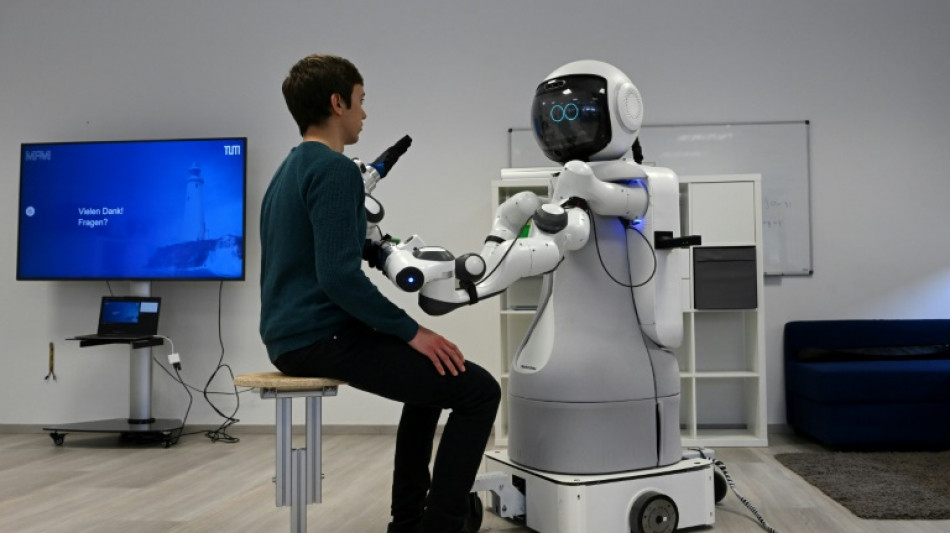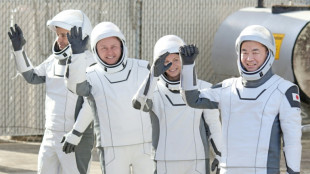
-
 Five things to know about Uganda
Five things to know about Uganda
-
Uganda votes under internet blackout and police crackdown

-
 Dreams on hold for Rohingya children in Bangladesh camps
Dreams on hold for Rohingya children in Bangladesh camps
-
Canada's Carney in Beijing for trade talks with Chinese leaders

-
 All Blacks fire coach Robertson less than two years before World Cup
All Blacks fire coach Robertson less than two years before World Cup
-
Long-awaited EU-Mercosur trade pact set for signing

-
 Trump embraces AI deepfakes in political messaging
Trump embraces AI deepfakes in political messaging
-
A year of Trump: US health policy reshaped in RFK Jr's image

-
 One year in, Trump shattering global order
One year in, Trump shattering global order
-
Hit TV show 'Heated Rivalry' a welcome surprise for gay hockey community

-
 Spanish singer Julio Iglesias prepares defence against abuse allegations: Hola! magazine
Spanish singer Julio Iglesias prepares defence against abuse allegations: Hola! magazine
-
Actor McConaughey seeks to patent image to protect from AI

-
 Musk's Grok barred from undressing images after global backlash
Musk's Grok barred from undressing images after global backlash
-
Hosts Morocco set up Senegal AFCON final showdown

-
 Trump says Iran killings stopped, Tehran says 'no plan for hanging'
Trump says Iran killings stopped, Tehran says 'no plan for hanging'
-
Chelsea paid for costly errors in Arsenal defeat, says Rosenior

-
 Morocco beat Nigeria on penalties to reach Africa Cup of Nations final
Morocco beat Nigeria on penalties to reach Africa Cup of Nations final
-
Golden Globes viewership shrinks again

-
 Astronauts leave ISS in first-ever medical evacuation
Astronauts leave ISS in first-ever medical evacuation
-
NASA reports record heat but omits reference to climate change

-
 Trump praises 'terrific' new Venezuela leader after call
Trump praises 'terrific' new Venezuela leader after call
-
Real Madrid crash out of Copa del Rey at Albacete on Arbeloa debut

-
 Trump says Iran killings stopped as US scales back Qatar base
Trump says Iran killings stopped as US scales back Qatar base
-
Arsenal beat Rosenior's Chelsea in League Cup semi first leg

-
 US stocks fall again as Iran worries lift oil prices
US stocks fall again as Iran worries lift oil prices
-
Inter extend Serie A lead to six points after Napoli slip

-
 Bayern beat Cologne to move 11 points clear in Bundesliga
Bayern beat Cologne to move 11 points clear in Bundesliga
-
Mane takes Senegal past Egypt into final of his last AFCON

-
 Trump says Greenland will 'work out' after Denmark fails to bridge gap
Trump says Greenland will 'work out' after Denmark fails to bridge gap
-
'Bridgerton' premieres in Paris promising 'Cinderella with a twist'

-
 California begins probe of Musk's Grok over sexualized AI images
California begins probe of Musk's Grok over sexualized AI images
-
Astronauts set to leave ISS in first-ever medical evacuation

-
 Napoli's stalemate with Parma opens door for Serie A leaders Inter
Napoli's stalemate with Parma opens door for Serie A leaders Inter
-
Syrian leader urges Kurdish integration as army sends troops east of Aleppo

-
 Denmark says White House talks failed to alter US designs on Greenland
Denmark says White House talks failed to alter US designs on Greenland
-
Venezuela looking to 'new era' after Maduro ouster, says interim leader

-
 Mane takes dominant Senegal past Egypt into AFCON final
Mane takes dominant Senegal past Egypt into AFCON final
-
UK police admit 'mistakes' over Maccabi Tel Aviv fan ban

-
 Promoter says Joshua will return to ring when 'time is right' after horror crash
Promoter says Joshua will return to ring when 'time is right' after horror crash
-
California investigating Grok AI over lewd fake images

-
 Wales's Faletau set to miss bulk of Six Nations
Wales's Faletau set to miss bulk of Six Nations
-
Denmark, Greenland wrap up crunch White House talks

-
 England sweating on Fin Smith's fitness for Six Nations opener
England sweating on Fin Smith's fitness for Six Nations opener
-
NASA acknowledges record heat but avoids referencing climate change

-
 England rugby league coach Wane quits role
England rugby league coach Wane quits role
-
Oil prices extend gains on Iran worries

-
 European basketball pioneer Schrempf lauds 'global' NBA
European basketball pioneer Schrempf lauds 'global' NBA
-
Denmark, Greenland in crunch White House talks as Trump ups pressure

-
 Mitchell hits ton as New Zealand down India to level ODI series
Mitchell hits ton as New Zealand down India to level ODI series
-
Syrian army tells civilians to stay away from Kurdish positions east of Aleppo


Lacking health workers, Germany taps robots for elder care
The white-coloured humanoid "Garmi" does not look much different from a typical robot -- it stands on a platform with wheels and is equipped with a black screen on which two blue circles acting as eyes are attached.
But retired German doctor Guenter Steinebach, 78, said: "For me, this robot is a dream."
Not only is Garmi able to perform diagnostics on patients, it can also provide care and treatment for them. Or at least, that is the plan.
Garmi is a product of a new sector called geriatronics, a discipline that taps advanced technologies like robotics, IT and 3D technology for geriatrics, gerontology and nursing.
About a dozen scientists built Garmi with the help of medical practitioners like Steinebach at the Munich Institute of Robotics and Machine Intelligence.
Part of the Technical University of Munich, the institute based its unit specialising in geriatronics in Garmisch-Partenkirchen, a ski resort that is home to one of the highest proportion of elderly people in Germany.
Europe's most populous country is itself one of the world's most rapidly ageing societies.
With the number of people needing care growing quickly and an estimated 670,000 carer posts to go unfilled in Germany by 2050, the researchers are racing to conceive robots that can take over some of the tasks carried out today by nurses, carers and doctors.
"We have ATMs where we can get cash today. We can imagine that one day, based on the same model, people can come to get their medical examination in a kind of technology hub," said Abdeldjallil Naceri, 43, the lead scientist of the lab.
Doctors could then evaluate the results of the robot's diagnostics from a distance, something that could be particularly valuable for people living in remote communities.
Alternatively the machine could offer a more personalised service at home or in a care home -- by serving meals, opening a bottle of water, calling for help in case of a fall or organising a video call with family and friends.
- 'We must get there' -
In the Garmisch laboratory, Steinebach sat down at a table equipped with three screens and a joystick as he got ready to test the robot's progress.
At the other end of the room, a researcher designated as a test model took his spot in front of Garmi, which poses a stethoscope on his chest -- an action directed by Steinebach from afar via the joystick.
Medical data immediately appear on the doctor's screen.
"Imagine if I had had that in my old practice," Steinebach said, while moving the joystick.
Besides the retired doctor, other medical practitioners also visit the lab regularly to offer their ideas and feedback on the robot.
"It's like a three-year-old child. We have to teach it everything," Naceri said.
It's anyone's guess when Garmi might be ready on a commercial scale.
But Naceri is convinced that "we must get there, the statistics are clear that it is urgent".
"From 2030, we must be able to integrate this kind of technology in our society."
- Question of trust -
And if it is indeed deployed one day, residents of the Sankt Vinzenz retirement home in Garmisch, a partner of the project, will likely see Garmi whizzing down the corridors.
Just thinking about it made Mrs Rohrer, a 74-year-old resident at the home, smile.
"There are things that a robot can do, for example, serve a drink or bring meals," she said as Eva Pioskowik, the director of the home, did her nails.
Pioskowik, who battles with staffing shortages on a daily basis, said she did not expect the robot to take the place of health workers.
"But it could allow our staff to spend a bit more time with the residents," she said.
For Naceri's team, one of the major challenges is not technological, medical or financial.
Rather, it remains to be seen if most patients will accept the robot.
"They need to trust the robot," he said. "They need to be able to use it like we use a smartphone today."
N.Awad--SF-PST

